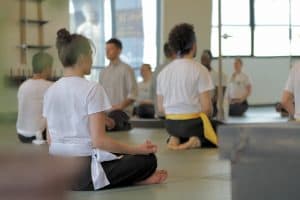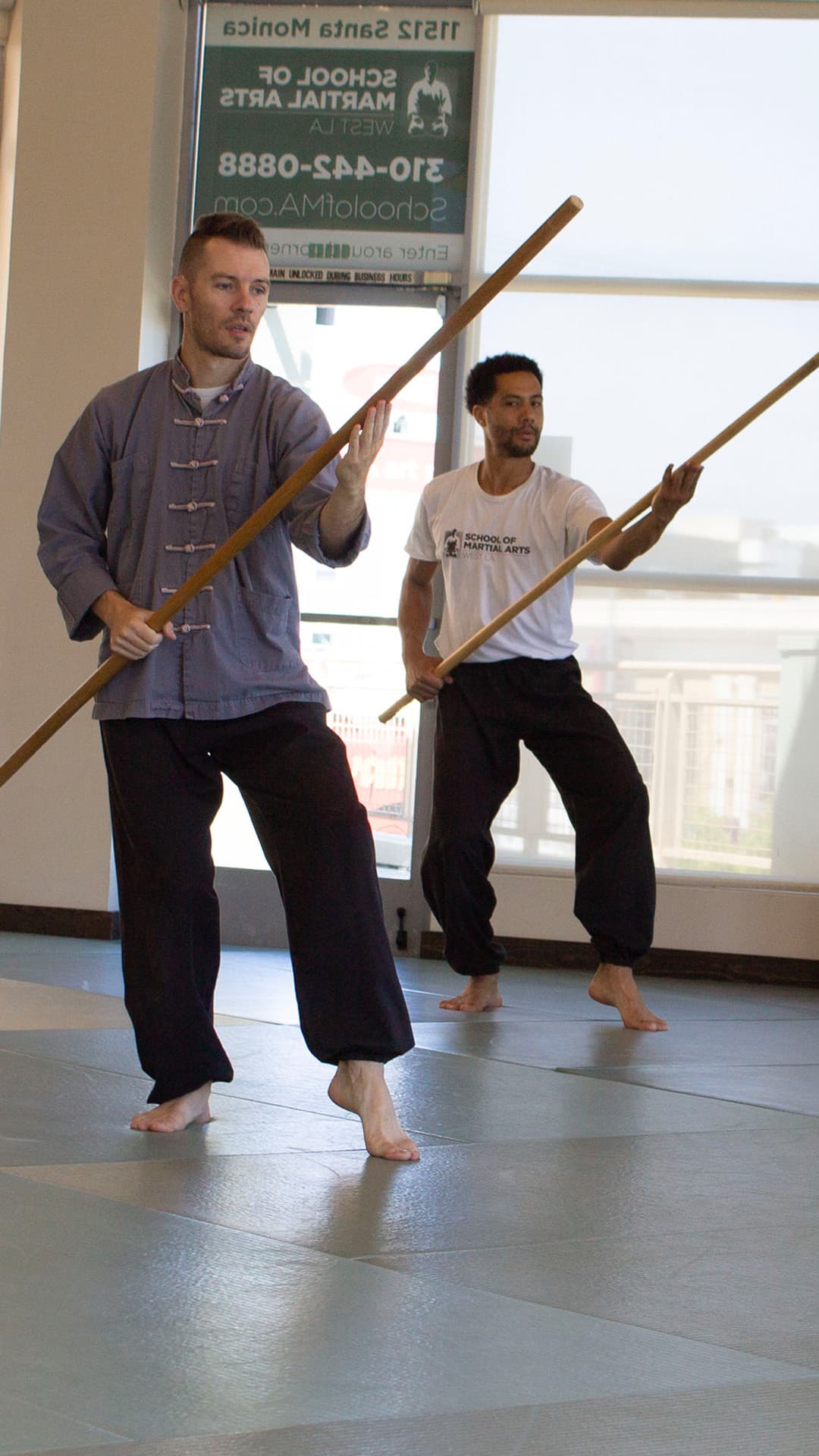Why Meditate?
About 15 years ago I sat down for the first time to meditate at Sifu Brown’s School of Martial Arts in Berkley, MI. It was a free meditation class, just like the one we give here, teaching a sitting meditation where we focus on the breath to clear the mind of thought. A friend had brought me so that I could see what the school was like. Sifu Brown gave an inspirational talk and we sat to meditate for about 20 minutes. During this time, I went from sitting up cross-legged with good posture to being curled up against the wall in fetal position. I just wasn’t used to sitting still and it was quite uncomfortable for me. Still, during those 20 minutes, I had one fleeting moment of clarity. I felt my lungs fill and empty with air and marveled at the sensation. For a split second, I had no other thought. Of course, as soon as I recognized it, I ruined that moment by heaping praise on myself for having such immense focus and discipline. Just as soon as I found that clarity, it was gone. But I was hooked. I continue to meditate every day, and Sifu Brown didn’t get rid of me until he tested me for Black Sash ten years later and I left for Los Angeles to teach martial arts and meditation in my own school.
What is Meditation?
I hear this question often and there are many answers. Some people mysteriously say, “It is something you must figure out for yourself.” One answer I would like to give sometimes is a firm slap to put a student in mushin, a state of no-mind. A more appropriate answer might just be a silent inhale and exhale. While there are many different forms of meditation, most adhere to certain principles. On a basic level, meditation is about quieting the mind which is typically achieved by stilling the body. Yet there are moving meditations such as Tai Chi and various forms of yoga. Other types of meditation practiced are transcendental, focus on a mantra, focus on a point on the ground, compassion meditation, general awareness of passing thoughts, etc. The type we practice is Zazen sitting meditation, with a focus is on the breath. What all these practices have in common is attention on the mind, or rather no-mind.
There is an ancient story about a Buddhist Scholar who went to a Zen master to inquire about Zen. As the Zen master talked, the learned man would frequently interrupt him with remarks like, “Oh yes, we have that too,” and so forth. Finally the Zen master stopped talking and began to serve tea to the learned man; however he kept on pouring and the teacup overflowed. “Enough! No more can go into the cup.” The learned man said.
“Indeed, I see,” answered the Zen master. “You are like this cup. You come and ask for teaching, but your cup is full; I can’t put anything in. Before I can teach you, you’ll have to empty your cup.”
In Artist of the Mind, Bruce Lee writes, “No-mindedness (mushin) is not a blank mind that excludes all emotions; nor is it simply calmness and quietness of mind. Although quietude and calmness are important, it is the ‘non-graspingness’ of the mind that mainly constitutes the principle of no-mindedness. A kung fu man employs his mind as a mirror – it grasps nothing and refuses nothing; it receives but does not keep.”
Practicing mediation helps bring you to this non-grasping state while on the mats and in daily life. You become less attached to results and more present to things happening in the moment.
Like anything in life, meditation should not be rushed into but rather practiced slowly and diligently with good teachers to ask advice from. Just like you wouldn’t attempt a Flying Kick after a month of practicing Martial Arts, you also should not attempt to sit for three hours at a time when first beginning meditation. Just like the body has to slowly be trained, so does the mind. Many people start with 15 or even 5 minutes a day and slowly build up. The point is not how long you’re sitting for but simply the fact that you’re sitting.
A common complaint is that there is simply not enough time in the day to meditate. A great basic way to deal with this issue is to go to bed a few minutes later or get up a few minutes earlier, depending on when you choose to meditate. Time Magazine reported a few years ago that of the most important life changes to make, mediation was ranked second only to organizing your life. As Brian Tracy says, “Set peace of mind as your highest goal, and organize your life around it.”
While meditation is an ancient practice that dates back 1,000’s of years, scientists have recently acknowledged it as something that helps with overall health and wellbeing. In January of 2011, The Harvard Gazette reported that a study done at Massachusetts General Hospital revealed that meditation “increased gray-matter density in the hippocampus, known to be important for learning and memory, and in structures associated with self-awareness, compassion, and introspection.”
Some general benefits of meditation are improved focus, reduced stress, spiritual connection, and happiness.
Improved Focus
Part of why I love meditation so much is because of the challenge. The reason meditation is such an effective tool to strengthen focus and discipline is because it is so very challenging. While it can be immensely exciting, it is often incredibly boring. Many days, watching the breath is like watching paint dry. Yet cultivating this ability to focus on something as simple as the breath is like going to the gym to strengthen muscles. Lifting ever-increasing weights or running longer distances makes everyday physical activities easier. Meditation increases one’s ability to focus to a point where staying on task with everyday mental activities is far easier.
Early on, I found the mental discipline and increased focus fostered by meditation and martial arts to be a powerful tool. I went from a C student in high school to a 4.0 GPA in college. I transferred to University of Michigan and had no issue keeping up with the massive work load required at one of the most demanding political science departments in the country. I did this while travelling back home (a drive of an hour or more) 3-4 nights a week to practice (2-3 hours at a time) and meditate with my fellow students. This sounds like a crazy amount of work, but honestly it was just fun.
Reduce Stress
The connection between the mind and body is strong. Our internal state is reflected in our external state; if we change the condition of our mind, we change the condition of our body. Stress can lead to many different conditions such as heart disease, obesity, headaches, depression, anxiety, gastrointestinal problems, Alzheimer’s and accelerated aging.
Nobody who has known me throughout my life would characterize me as stressed. Yet in high school, just before I started meditating, I was diagnosed with a version of Acid Reflux that I was taking medication for. About one month after I started meditating and practicing martial arts with Sifu Brown, it went away completely. My acne even cleared up. Whatever stress I wasn’t even aware of (and had apparently been bottling up to my physical detriment) disappeared.
Regular meditators report that they are better able to deal with stressful situations and thoughts as they arise rather than after they have become overwhelmed by them. Many people aren’t even aware of the negative emotions and other impacts of a stressful situation until it has begun to take effect. Using the boulder at the top of a hill analogy, most people stand somewhere between the middle and bottom of the hill, just waiting to get squashed. Meditation helps us be more in tune with our thoughts and emotions, as well as those of people around us. This puts us at the top of the hill with our hand right on the boulder, keeping it from rolling down the hill and prevents things from getting too out of control.
Spiritual Connection
Whatever your beliefs, meditation is a wonderful addition to spiritual practice. Sifu Brown likes to say, “No religion has a problem with the breath.”
If your faith says, “We don’t breathe” it probably won’t last long.
We have students of many different faiths, and anyone who cultivates a regular meditation practice finds it a powerful way to connect on a deeper level. Prayer, visualization, empathy, and many other practices are strengthened through meditation. In fact, this is a two-way street. Your meditation can benefit greatly from spiritual practice. Devotion to a higher power, whatever that may be, is an excellent tool to inspire deep meditation and to keep you coming back to the cushion, especially when life isn’t cooperating and you least feel like sitting.
Happiness
Meditation makes you happy. It’s as simple as that. It allows you to fully appreciate the great things in life and the ability to move on from the not-so-great. You can’t always choose what happens to you, but you can choose how you interpret events and respond. If you decide to be happy, in any moment, you can find a way to make that happen. If you want to be unhappy, you can also choose that. Meditation gives us awareness of that choice and the freedom to have the thoughts we want, which therefore leads to the emotional state we want.
Meditation (and the mindfulness it brings) helps us realize each moment more fully. Rather than allowing life to happen to us, we choose to how we live. We are present for each conversation, every step and every breath. We realize that as long as we can breathe, we can handle the things we are dealing with today, in this moment. More than that, we can be completely focused, healthy and intimately connected. We don’t just survive, we thrive.
Author: Sifu Ryan Scott, School of Martial Arts—West LA
If you live in the Los Angeles area, we invite you to our free meditation class every Thursday night at 7:30. We hope to see you here!





Max Gillis
Fantastic Sifu Scott! Hope things are going well.